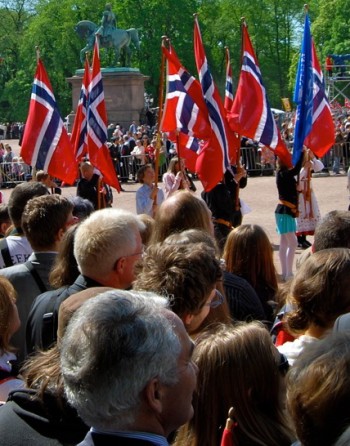A majority of Norwegians say they’re willing to accept reductions in the country’s state welfare programs, from less sick leave pay to cuts in unemployment benefits, if it will ensure economic growth. They’re also willing to keep paying high taxes, according to a survey conducted by Norwegian research foundation Fafo.

Fafo was holding its annual conference in Oslo this week, which always climaxes with its celebrated Friday evening party that assembles many of Norway’s most powerful people in politics, business, academia and the media. Two of its researchers, Jon M Hippe and Tone Fløtten, grabbed headlines and topped newscasts on Friday with their findings that many Norwegians don’t view their famed social welfare state as set in stone.
More than half (51 percent) of all persons questioned in their survey answered that they were willing to accept reduced benefits to secure economic growth. Those responding who identified themselves as adhering to the non-socialist political parties were the most willing to give up benefits, while those on the left side of politics were less willing. Among those who identified themselves with the Labour Party, though, nearly 40 percent said they agreed that welfare programs must be tightened if needed to bolster the economy. That prompted Fafo researcher Hippe to comment on NRK’s national radio Friday that support for welfare reductions was found among voters on both the right and the left.
Economic concerns rising
Fafo’s findings come after a week of reports that Norway’s long-booming economy may slow down and that dramatic welfare cuts may be needed if oil prices take a dive. It also was a week that saw a decline in the strength of the country’s currency, the krone, which has stayed at record strong levels for many months. Norway’s economy has become used to high oil prices of more than USD 100 a barrel in recent years, and that has fueled growth in all the oil-related service sectors as well in real estate prices and salaries in general. If the economies of other countries that need lots of oil, like China, contract, as some economists predict they will, the oil price may even decline by half. That means oil investments, real estate and other aspects of the Norwegian economy may contract as well.
Most foresee ongoing economic strength in Norway, while some doomsday scenarios involve higher unemployment, pay cuts and a crack in the long-hot real estate market. Prime Minister Jens Stoltenberg of the Labour Party said earlier in the week that if his government is re-elected next month, he’ll spend even less oil revenues than he could under the generally accepted rule that guides use of the money, preferring to save it for the proverbial rainy day.
Stoltenberg believes the Norwegian economy is not immune to shocks, and that giving into the impulse to use more oil revenues will overheat it. He only wants to use 3 percent of the size of the so-called “oil fund” where the revenues are stashed, instead of the 4 percent he could use.
Others argued that doesn’t mean the next state budget will be necessarily tighter, though, because the fund itself keeps growing. Using 3 percent of it next year instead of 4 percent of it this year can thus amount to more actual money being put into the state budget next year.
Still satisfied
The Fafo study, meanwhile, revealed that most Norwegians are “quite satisfied” with their society at present, while the total who say they’re “very- or quite satisfied” had grown from around 50 percent of the population in 1999 to around 70 percent by 2011.
The vast majority of Norwegians is also willing to retain or even increase tax levels as a means of evening out wealth differences within the population. Less than 20 percent of those questioned in the nationwide survey advocated lower taxes, while more than 60 percent agreed it was necessary to maintain a high tax level. More than 80 percent said that tax cheats “can’t be accepted.”
Most everyone, at both ends of the political spectrum, agreed that the much vaunted “Norwegian Model” in which employers and labour leaders directly negotiate pay levels and workplace conditions under the watchful eyes of politicians will guard Norwegians against the ill effects of an economic downturn. Few agreed that Norwegians must accept weaker workplace rights.
newsinenglish.no/Nina Berglund

